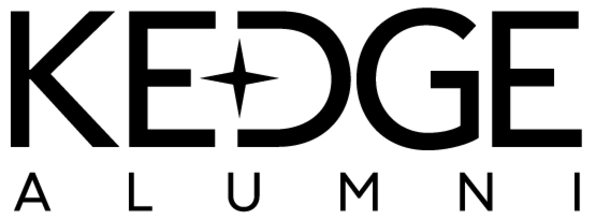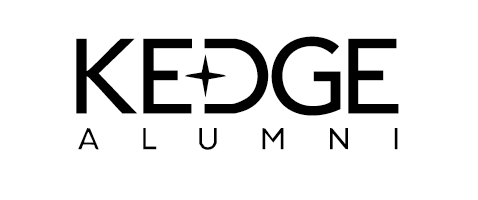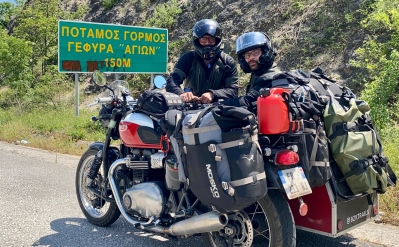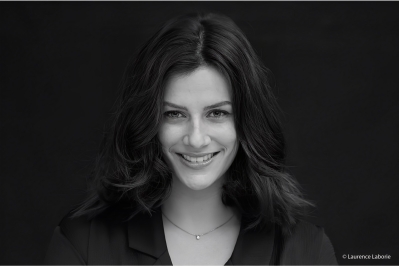News

Meet Élodie, a KEDGE Graduate Living in Buenos Aires
The five students from the “KEDGE Alumni Success” pro-act are currently in South America, meeting with our expatriate alumni.
Can you tell us about your academic background and your studies at KEDGE? In what context did you study there?
I first completed a Master’s in Law at the University of Sceaux, then pursued a specialized Master’s in Event Communication at KEDGE Marseille.
This program lasted one year at the time, with a one-month refresher course for those like me who had never studied business, followed by six months of classes in Marseille and a six-month internship.
I did a rather unusual internship (laughs) at a company that organized luxury weddings for European princes and princesses. My boss was 84 years old, the company had no website or email, and worked with small, not-so-pretty photos—but the events were surprisingly excellent. The company’s only visibility came from magazines like Point de Vue and Paris Match. There was no possibility of being hired afterward.
The company was very “old school,” and my internship was quite unconventional, but I knew why I was there—my goal was to learn the codes of the industry.
Why did you decide to move to Buenos Aires? Was it a personal desire or an opportunity you seized?
I finished my internship in July 2008 with the intention of starting my own business in Geneva (my hometown) in September. Unfortunately, the financial crisis hit at that exact moment. Working in the event industry in Geneva—a financial hub in crisis where everyone was being laid off—was complicated. So I gave up on launching my business. It just wasn’t the right time.
Event planning is a passion-driven profession. You’re poorly paid at first, it’s hard to get a permanent contract, and the industry is tough. Add a financial crisis to that, and it becomes impossible.
I actively looked for work, without success. Then in February 2009, I traveled to Argentina (Cordoba) for a family visit to get a change of scenery and see what was happening across the Atlantic.
And Argentina… it’s sunny, warm, the people are welcoming, and life is very affordable (laughs). So I decided to stay for a better quality of life and to learn Spanish.
During my first year in Argentina, I didn’t have a stable job because I didn’t have the proper paperwork. On top of that, I was overqualified—companies were afraid of my potential salary expectations. At the time, I was told that earning €400 a month was already good, but that didn’t work for me.
So I took on a few missions for foreign companies that needed a local contact. I was paid quite well. That was in 2009. One day, I realized that the internet was improving, but there weren’t many websites listing housing options or things to do in Buenos Aires. Many institutions had websites, but no one to update them—it was very hard to find information.
I decided I wanted to share what I knew and create a website dedicated to this.
So I created Buenos Aires Connect, a site offering information on restaurants, culture (theaters, museums, walks, customs), to help people understand that French life is very different from Argentine life, despite our cultural proximity. The “South American touch” changes a lot of things, and if no one helps you understand that, you only realize the nuances two years after arriving—even though they’re extremely important. That was my initial idea, with the “fantasy” of earning money through advertising—but that’s a myth (laughs).
You need traffic first. So I set up a housing assistance service—shared flats, medium- and long-term rentals—because back then, apps didn’t exist and finding a place to live was really hard. Ten years ago, it was a real “battle” (laughs).
The shared housing service took off immediately because it’s the first challenge students face when arriving in Buenos Aires.
Then we expanded from shared flats to apartments. Real estate is now my main activity. I chose to build a website instead of an app because apps are expensive, people are overwhelmed by them, and you have to pay to make changes.
As for the team, we have writers who manage content and communication, others who search for properties, and translators since the site is in both French and Spanish. Half of the team is French, the other half Argentine. Uh… what was the question again? (laughs)
I came here thinking, “I’ll try a project—if it works, great; if not, no big deal.”
I arrived at a time when the situation was favorable—it was affordable and doable. In Argentina, you can go from rich to poor in four months with the same amount of money. Back then, Argentina was practically free. If I had arrived a year or two later, I wouldn’t have launched anything.
What differences do you notice in the way people work or manage between Bolivia and France?
As a business owner, I’ve been able to develop my own management style. I believe quality of life is essential in the workplace, so I’ve implemented a flexible and relaxed system. Working hours aren’t strict, nor are vacation policies. My management style is very trust-based. I don’t have time to play the role of a police officer—and I’m not interested in doing so. We hold meetings to check in and move forward, yes, but everyone has their own role and responsibilities. At lunchtime, we all eat together, brainstorm, ask questions, and share advice.
I aim for the best possible quality of life—it’s also part of the Argentine lifestyle.
The office opens at 10 a.m., many people don’t arrive on time, some work from home—I adapt, and as long as the results are there, I don’t mind.
More generally, in Argentina, priorities are a bit different from ours. Number one is family and friends, number two is work. Argentina is a country that goes through crises every 10 to 15 years. Even though labor laws are almost as protective as in France, things come and go—today someone might be an engineer, tomorrow a taxi driver, and the day after a pastry chef. Argentinians are constantly evolving and changing. Just because you studied law doesn’t mean you’ll stay in that field forever.
I had never worked in real estate or built a website before moving here, and everyone said, “That’s great, it’s going to be amazing!” (laughs), so I went for it. Here, you have to try. In a way, they’re right—what really matters is your inner circle. Work is important—it puts food on the table—but when there’s no work ten years later, you’ll be glad to have your loved ones around. We tend to forget that in Europe, thanks to—or because of—the intense competitiveness of the market.
In France, we lose sight of our priorities and struggle to question ourselves.
Because of competitiveness, you become obsessed with work. Me? When I go on vacation, everything stops, and I don’t care. It’s important to recharge.
What are your plans for the future? Where do you see yourself in 5 or 10 years?
I’m not really sure. Right now, I’m waiting to receive my official real estate agent license so I can move into sales—that’s my short-term goal.
As for the medium or long term… I have no idea. In Argentina, long-term planning is uncertain. There’s an economic crisis right now—so is it worth staying? I don’t know. I’m not Argentine, so I have the option to leave, which is a privilege. The company is celebrating its 9th anniversary, but if things stop working, we’ll adapt.
I love Argentina, and it will be very hard for me to leave—but if things don’t work out in the future, I won’t have a choice.
How did KEDGE help you when you settled in Argentina (training, network, internships, work-study, VIE…)?
I have a legal background, but I realized it wasn’t really “my thing,” as they say.
I’ve always been drawn to management and business. I specialized in event planning at KEDGE, which gave me a solid foundation in marketing and management. KEDGE also helped me build a broad network of people from diverse backgrounds and with different personalities—people who studied everything from sports to biology to architecture. That’s a big change from the legal world (laughs).
I really enjoy the exchange of ideas—it’s incredibly important to communicate with people who have different profiles. It pushes your thinking further.
Did you have any apprehensions before leaving?
I booked my ticket five days before leaving, so I didn’t really have time to overthink it (laughs). And Argentinians are incredibly welcoming—it’s a big, cosmopolitan city that’s very European in style.
When I arrived, I found people to be very fair-skinned (laughs). It wasn’t the image I had of Argentina—I was surprised by how culturally close we are. Argentinians are much more refined than other South American countries.
Let’s not forget that the original Argentine population was largely wiped out by European colonization.
What advice would you give to a recent KEDGE graduate who’s considering starting their career in Latin America?
You start a business in Argentina because you’ve fallen in love—with the country or with someone. Otherwise, you don’t start a business in Argentina. When you arrive, you’re charmed by everything, it all seems easy because luck is on your side—until things get complicated. And when they do here, they really get complicated.
This isn’t a project you should plan from France. You need to come here and take at least six months to see if it’s possible to build a business that appeals to people locally—and to see if you personally adapt well to the country. First, you need to understand what you can offer to the place. When you have a business idea, you imagine a whole scenario, but you quickly realize it might not work—or you need to be flexible.
Ultimately, take your time to see what’s feasible and whether you’ll enjoy living here.
Which sectors are thriving in this country, in your opinion? Are there opportunities for young graduates (in your company or elsewhere)?
Anything related to creativity and advertising—Argentinians are very talented and affordable. Cinema—Buenos Aires is the capital of film, and people here are incredibly creative. Tourism, of course. Agriculture is huge, with wine, grains, and meat.
KEDGE’s Wine & Spirits specialization can be very useful in Argentina, as vineyards are very fond of French professionals. For a first experience, it’s much easier here—and you’ll get real responsibilities.
What have you found here that you wouldn’t find in France?
Definitely flexibility and freedom. Argentina has a mindset that allows you to express yourself and try things. That’s changing gradually, but still—my lifestyle and quality of life here wouldn’t have been possible in Paris, and it wouldn’t have been so easy in France either.
What is your role as an Alumni? You graduated from KEDGE and are now part of our global network.
There are 12 of us in Buenos Aires, and it’s always a pleasure to meet fellow Kedgers and share a common bond in a foreign country. Here, we also want to connect with graduates from other schools to expand our network even further. The group has been gradually forming since February.






